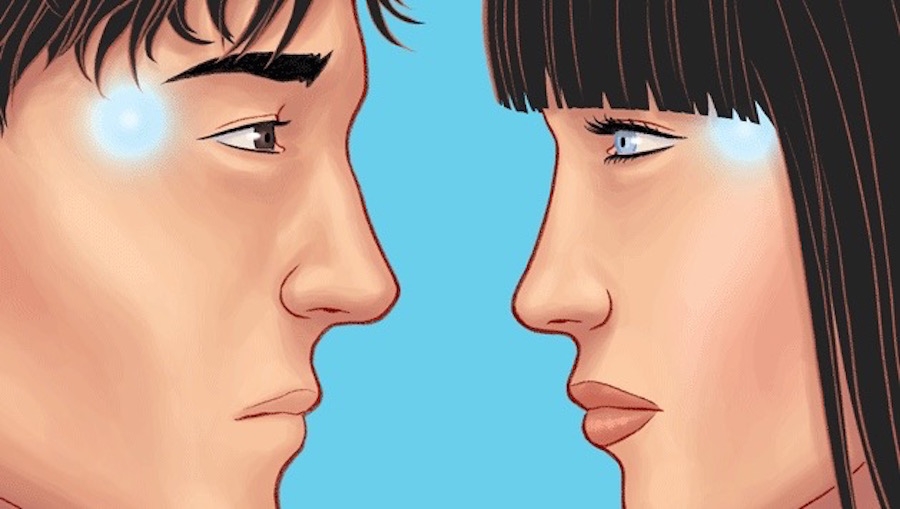My grandparents were always big readers. Their house was, among other things, a paperback lover’s wonderland – bookshelves at every turn, laden with volumes from the most recent bestsellers to old, worn copies of long-forgotten masterpieces. My grandfather, in particular, shaped many of my own tastes. The book I most remember receiving, reading, and loving was Isaac Asimov’s I, Robot. I recommend it. The only thing it shares with the Will Smith movie is a name (and, I guess, that there are robots in it).
Sarah Vaughn and Jonathan Luna’s Alex + Ada reminds me a lot of Asimov’s Robot series, from the stories in I, Robot to the trilogy of futuristic detective novels that followed it. It hearkens back to a style of science fiction which Asimov himself produced, thoughtful and reserved in many ways, without needing to reach for world-ending crises or warfare as backdrops to keep things interesting.
Alex + Ada is a quiet and all-too-plausible romantic drama about Alex, a twenty-something company man, and Ada, the state-of-the-art android his grandmother buys him to help him get over a bad breakup. (She is, in many ways, basically the coolest grandmother ever.) Unfortunately, an incident with a sentient AI has ensured that sentience, while technologically possible, is illegal for robots of any kind, so Ada is little more than an elaborate appliance. At least, that is, until Alex discovers there are ways to make her sentient – as long as he doesn’t mind breaking the law. Their journey is not entirely unpredictable and, at times, problematic (I’m not sure that this book passes the Bechdel test, for instance, and you’ve always got an uphill climb when the book’s main female character starts as an automated sex partner.), but it feels highly relatable, whether you see yourself in subdued, but periodically impassioned, Alex or persecuted, identity-seeking Ada. The question of machine sentience isn’t an irrelevant one, of course, as our mastery of artificial intelligence improves, but it’s hard not to see the depictions of hatred and prejudice against sentient robots as a broad allegory for the plight of any one of several real communities in America.
I was initially put off by Luna’s too-perfect style, and I still wonder if there isn’t some intent behind making everyone in the book appear featureless in a decade-old CG animation kind of way. (Maybe it’s a visual reference to 2005’s artificial intelligence interactive story, Façade?) But the story worked hard enough, and the cast was interesting enough, that soon I appreciated the sort of stark cleanliness of the world Alex and Ada inhabit. Like in some of Asimov’s work about robots, the world has a surreal uniformity which, I suppose, just makes it all the better to break free from. And, in the end, it’s hard not to feel for Alex and Ada, just as it’s hard not to reflect upon the views of those around them and wonder just where you’d stand, in the end.
For the classic sci-fi fan, those who seek thoughtful futurism over whiz-bang action, Alex + Ada is easy to recommend. I mean, heck, aside from the obvious focus on robots, it’s got some cool ideas about how people may interact with the world a few decades down the line. It feels like it could easily be a cousin, maybe, to the Spike Jonze film, Her. And, you know, if you find your way to Alex + Ada, maybe shelve it right next to I, Robot – I think they’ll get along.

